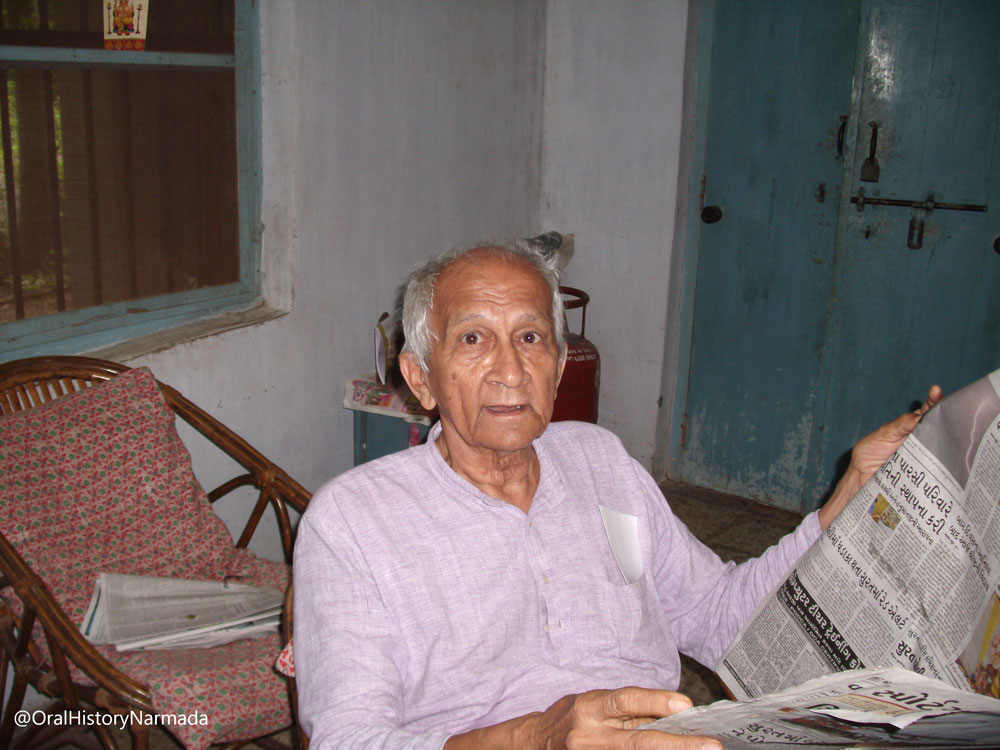0:00:00 to 0:09:30 | Childhood, family, freedom struggle in Mumbai, seeing Gandhiji at Azad Maidan in Mumbai in 1935 and schooling. |
0:09:30 to 0:18:00 | Struggle for independence in 1942 and 1944 in Mumbai, jail experience at Byculla jail, radio by freedom fighter Usha Mehta, underground activity during freedom struggle of publishing and distributing literature, protests, police actions, people’s involvement in the struggle for freedom. |
0:18:00 to 0:28:07 | Becoming an educationist soon after independence and teaching at different institutions including the Gandhi Vidyapith, Lok Bharti, Sanosara; Dakshina Murti, Bhavnagar. |
0:28:07 to 0:32:00 | 15th August 1947 as remembered by Jyotibhai with the then Chief Minister of Mumbai Shri Balasaheb Gangadhar Kher. His work with Rashtra Seva Dal, and his colleagues at Rashtra Seva Dal. |
0:32:00 to 0:38:45 | Marriage, coming to Vedchi in 1968, jail experiences post India’s independence, participation in various people’s movements including over the issue of pollution in the Tungabhadra River in Karnataka with S.R. Hiremath, arrest during the agitation for removal of Official Secrets Act at Kevadia in 1989, details of work with Late Jayprakash Narayan in Musheri in the Naxal area, Sampurna Kranti, etc. |
0:38:45 to 0:45:45 | About floods in Jaipur in 1980, dumping of waste in Tungabhadra river by Grasim and the Birla industries, the people’s struggle against this. |
0:45:45 to 0:53:22 | Involvement in the issue of Narmada Dam, about the late Kashinath ji Trivedi, Arch-Vahini, Anil Patel, Ambrish Mehta, the Dam issue in Madhya Pradesh, the Tapi dam and issues therein, work of Jugatrambhai around the Tapi Dam, Ukai Navnirman Samiti of those displaced by Ukai Dam. |
0:53:22 to 1:00:29 | Concept of Development, struggle of oustees of Ukai Dam, rehabilitation issues of the Ukai Dam Oustees, Ramesh Desai and the group set up by Jugatrambhai to work with Ukai Dam Oustees, Narmada Oustees, coming of land for land policy, Justice Diwan Commission. |
1:00:20 to 1:05:07 | Involvement with the Narmada struggle, about Dinker Dave, Rajpipla Social Service Society, Medha Patkar, Shripad Dharmadhikary; challenging Official Secrets Act, visiting affected areas with NBA activist Arundhati Dhuru, the Morse commission and presentation before them, role of activists like Himanshu Thakker, Rohit Prajapati, etc. |
1:05:07 to 1:20:00 | Submergence and Jalsamarpan, response of senior Gandhians to SSP and the NBA in Gujarat, about Bhoomi Putra and its policy, Chimanbhai Patel, Jagdishbhai Shah, Babubhai Jashbhai Patel, Swami Sachidanand, public meeting in Jamnagar, and SSP, decision making in a movement, consensus building important in a struggle and the strategy of Jal Samarpan in NBA in the context of consensus. |
1:20:00 to 1:34:55 | Strategies in a people’s movement- people have to fight not activists, empowering people, on leadership, struggle against Rajiv Gandhi National Park near Dharwad and Belgaum, workshops in prison, work at Medhalekha. |
1:34:55 to 1:46:00 | Dantewada Sipu Dam struggles, Chunibhai Vaidya, Ferkuva struggle of the NBA, Chunibhai’s role, Gujarat Sarvoday Mandal’s offer to withdraw fast at Ferkuva brought by Jyotibhai, NBA/Medha’s fast in Delhi, how SSP becomes an iconic project of Gujarat, Chimanbhai Patel and similarities with Narendra Modi. |
1:46:00 to 2:00:00 | About those who supported the anti-dam struggle in Gujarat- Jashbhai Patel, Thakorebhai Shah, Girishbhai Patel, Rohit Prajapati, etc. Jyotibhai’s interactions with Babubhai Jashbhai Patel when he was the Narmada minister, with Sanatbhai Mehta when he was heading the SSP, about corruption in the project, death of workers, damage to the stilling basin of the dam, the media in Gujarat, the corporate lobby, about Tata Nano. |
2:00:00 to 2:07:43 | Misguiding of the people about SSP, fight in Ukai dam for rehabilitation and land for land policy, Ramesh Desai’s work, Arch Vahini’s work, the early satyagrahas, protest led by Ambrish Mehta of Arch Vahini in first village Vadgam to be submerged out of 19 villages in Gujarat, Jyotibhai’s involvement, opposition in Gujarat to National Alliance of People’s Movements. |
2:07:43 to 2:16:15 | Fundraising for the NBA, Dorabji Tata Trust, funds received through Lok Samiti, Malegaon, work of Narmada Jeevan Shalas, Jyotibhai’s involvement as an educationist in Narmada Jeevan Shalas, Jyotibhai as a trustee of Jan Sahyog Trust set up with the Right Livelihood Award funds. |
2:16:15 to 2:22:40 | Jyotibhai’s views on the achievements of NBA. |
2:22: 40 to 2:34:00 | Critique of NBA and its strategies, characteristics of a people’s movement, leadership issues in a people’s movement, electoral politics and people’s movements. |
2:34:00 to 2: 39: 20 | Protests and jails, personal life, marriage, home, study in UK and Oxford. |
2:39:20 to 2:44:19 | Maliniben, Jyotibhai’s wife on Jyotibhai. End |
